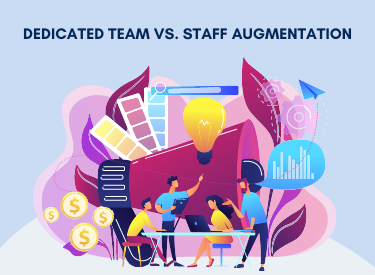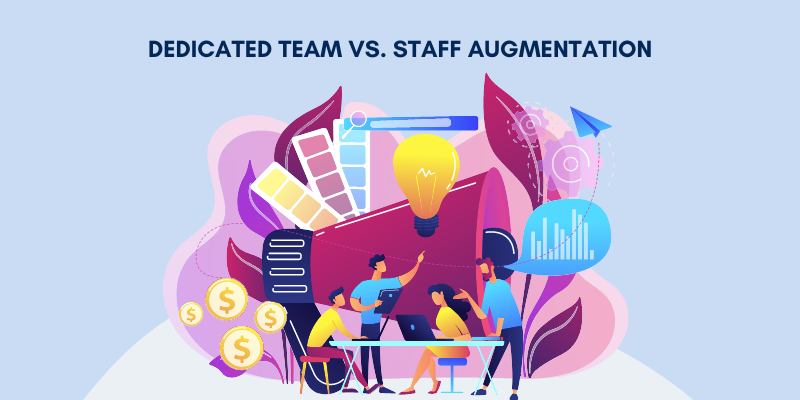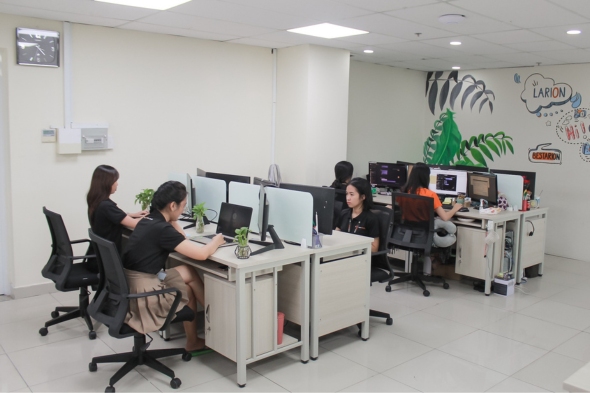Dedicated Team vs. Staff Augmentation


In a business world that is uncertain and constantly changing, there is a growing need for specialized IT services. However, the market faces a shortage of skilled software developers. The good news is that IT outsourcing has come to the rescue. With its many benefits, such as reducing project time and costs, leveraging the expertise of skilled IT partners, and improving operational efficiency, outsourcing allows you to focus on your core business. Consequently, more and more companies are entrusting IT jobs to external firms. When it comes to IT outsourcing, many companies grapple with choosing between staff augmentation and a dedicated team.
There are various ways to collaborate with a software vendor. Staff augmentation and outsourcing to a dedicated team are two of the most common models.
But how should you decide?
First, let’s briefly define each model.
What Does Staff Augmentation Mean?
Staff augmentation is an outsourcing model where a software development company provides employees to fill gaps in your team’s technical expertise. Outsourced developers become part of your engineering team but work remotely. Staff augmentation is also known as team expansion.
Most IT staff augmentation is done on a “time and materials” basis, meaning that the cost depends on the project size, scope, and the amount of work required. A fixed-price model might also be used, requiring a fixed budget and well-defined project scope.
Remember, even if you hire additional external staff, you still need to engage and attract new tech talent for your internal team. Organizations that work hard on this do not face this issue.
What Are the Benefits of IT Staff Augmentation?
Staff augmentation is an effective way to address changing customer needs and business challenges while increasing flexibility. Here are a few benefits:
- Flexibility: Staff augmentation allows organizations to add or remove workers as needed. For instance, a retailer might hire seasonal workers during the holidays to manage increased demand.
- Cost-Effective: Your team can expand without the costs associated with infrastructure or hiring and training internal staff. Clients pay only for the services they use and gain access to specialized skills as needed.
- Administrative Convenience: The provider handles administrative tasks, eliminating the need for you to find, interview, and train employees with the right skills and experience. This allows you to focus on your core business rather than paperwork and referrals.
What Are the Disadvantages of IT Staff Augmentation?
- Can Be Expensive: Companies might find staff augmentation more costly in the long run compared to hiring full-time employees or a dedicated team. If not managed correctly, it can exceed the cost of an in-house solution that offers longer-term benefits.
- Not Ideal for Ongoing Projects: Staff augmentation may not be suitable for long-term projects or ongoing talent needs. Workers may need to move on to other projects or seek permanent positions elsewhere before the project concludes. Additionally, costs are often based on time and materials, which could lead to paying for unneeded services.
- Not Suitable for Institutional Knowledge-Based Projects: Projects requiring a deep understanding of your business may experience delays as new hires take time to become acquainted with your operations.
- Risk of Dependency: Increased reliance on a third-party vendor can be problematic if the vendor cannot consistently provide the necessary talent or if specific skills are needed for multiple projects. In such cases, hiring permanent staff or securing a long-term contract might be more appropriate.
- Inconsistent Quality: High turnover rates associated with staff augmentation can lead to varying quality. Different suppliers and employees might affect the consistency of deliverables.
When to Use IT Staff Augmentation?
The suitability of any collaboration model depends on several key factors. Staff augmentation is ideal for businesses with a strong internal IT team and reliable management. However, if your internal team is overwhelmed with other tasks and a project needs to be completed quickly, you might consider other options, such as outsourcing.
Staff augmentation is beneficial when:
- You need to hire a small number of developers who are hard to find locally.
- You require specialized professionals that are not available in your area.
- You expect to manage and communicate with new team members regularly.
- You need to add a remote expert to your team.
What Is a Dedicated Team?
A dedicated team is an IT outsourcing model where a company provides a software development team that works remotely and is solely focused on your product and business goals. These developers are handpicked based on your requirements and can be managed directly by you.
Unlike other outsourcing models, a dedicated team allows you to lead and influence the project’s direction and the team’s composition. This model is particularly beneficial for startups and new products where creativity and unity are crucial for success.
With modern collaboration tools, the physical distance of a remote team is less noticeable. Additionally, team members may visit your location, strengthening partnerships, improving communication, and building long-term relationships.
What Are the Benefits of Hiring a Dedicated Team?
A dedicated team is often chosen when companies need to scale up for new projects or meet rising demand but lack the resources to find, hire, and train qualified personnel. Benefits include:
- Enhanced Collaboration: Dedicated teams can work closely with your internal staff, often forming a single, distributed team.
- Greater Control: This model allows customers to maintain better oversight of processes, quality standards, and project management.
- Predictable Costs: Working with a dedicated team typically involves a flat monthly rate, making budgeting easier and providing more control over expenses.
- Scalability: You can easily adjust team size to meet short-term demands or project needs without the long-term commitment and costs associated with permanent hires.
What Are Some Limitations?
While a dedicated team offers many advantages, it requires careful planning, coordination, and a clear understanding of how the outsourced team will help achieve specific goals. Limitations include:
- Not Suitable for Short-Term Projects: Dedicated teams are better suited for long-term or ongoing projects. They are not ideal for projects requiring short-term or immediate capacity increases.
- Potentially Higher Costs: Maintaining a dedicated team might be more expensive than time and materials or fixed-price contracts for short-term projects.
- Management Complexity: Managing a dedicated team requires a significant investment of time and effort, even though the vendor handles hiring and matching.
Many clients emphasize the importance of integrating external staff into the company culture. This involves maintaining open communication, setting clear expectations, and engaging in team-building activities.
When Should a Dedicated Team Be Used?
A dedicated team is well-suited for:
- Startups: Startups benefit from dedicated teams as they can quickly scale without significant hiring costs. This model also supports product development during the discovery phase.
- Long-Term or Complex Projects: For projects requiring in-depth understanding and ongoing refinement, a dedicated team offers continuity and accumulated knowledge over time.
- Projects with Unclear Requirements: If a project involves changing requirements or unclear specifications, a dedicated team can adapt and implement Agile practices effectively.
Comparing Dedicated Teams and Staff Augmentation
To determine which model is right for your business, consider the following factors:
- Project Duration and Scope: Dedicated teams are ideal for long-term projects with ongoing requirements, while staff augmentation is suited for short-term needs or specific tasks. If your project demands continuity and in-depth knowledge, a dedicated team may be preferable. For temporary needs or to address immediate skill gaps, staff augmentation can be more suitable.
- Budget Considerations: Dedicated teams often involve higher costs due to their long-term commitment and comprehensive involvement. Staff augmentation offers a more flexible and cost-effective solution for projects with fluctuating needs or shorter timelines.
- Level of Control and Management: If you require close oversight and control over the project and team, a dedicated team provides that level of engagement. Staff augmentation allows you to add expertise without the same level of management responsibility, but with less integration and control.
- Integration and Culture: A dedicated team can integrate more seamlessly into your organization, fostering a shared culture and long-term relationships. Staff augmentation may face challenges with integration and maintaining a cohesive team environment.
- Expertise Requirements: For specialized skills needed temporarily, staff augmentation provides access to the required expertise without long-term commitment. A dedicated team is better suited for projects requiring continuous involvement and deep understanding of your business.
Making the Decision
Choosing between a dedicated team and staff augmentation depends on your specific needs, project requirements, and organizational goals. Here are some scenarios to guide your decision:
- For Startups and New Projects: If you’re a startup or working on a new project with evolving requirements, a dedicated team can offer the stability and focus needed for success. They can become an integral part of your team, helping to shape and execute your vision.
- For Long-Term Development: If you have a long-term development project or ongoing needs, a dedicated team provides the consistency and deep engagement required for continuous progress and alignment with your business objectives.
- For Short-Term Needs and Flexibility: If you need to address immediate skill gaps or temporary project demands, staff augmentation offers a flexible and cost-effective solution. It allows you to scale resources up or down based on your current needs without a long-term commitment.
- For Specialized Expertise: When you require specific expertise for a particular project or task, staff augmentation can provide access to specialized skills on a temporary basis. This model allows you to leverage external knowledge without committing to permanent hires.
Conclusion
Both dedicated teams and staff augmentation offer valuable outsourcing solutions, each with its unique advantages and challenges. Understanding the differences between these models can help you make an informed decision based on your project needs, budget, and organizational goals. Whether you choose a dedicated team for its focus and stability or staff augmentation for its flexibility and cost-effectiveness, selecting the right model will enable you to effectively manage your IT resources and drive successful outcomes for your business.
Bestarion’s Engagement Models
There are many ways to approach IT outsourcing, such as dedicated teams, staff augmentation, and other strategies. The right choice depends on your project needs, goals, and resources, and each model has its advantages.
If traditional models don’t fit your needs, working with a reputable outsourcing company like Bestarion can help. We offer tailored solutions that go beyond standard options, addressing your unique challenges with our broad range of services.
Our diverse range of engagement options allows you to find a solution that best fits your specific requirements.
1. IT Staff Augmentation
This model involves temporarily adding skilled professionals to your existing team to fill gaps in expertise or to meet increased workload demands. It is ideal for projects where you need to supplement your internal resources with specific technical skills without long-term commitments. Staff Augmentation allows you to scale your team quickly and efficiently, focusing on your core operations while experts handle the specialized tasks.
2. Dedicated Team
A Dedicated Team provides you with a group of skilled professionals who work exclusively on your project. This model is perfect for long-term projects or ongoing needs, where a consistent and dedicated team can integrate with your internal staff and align closely with your business objectives. The Dedicated Team approach fosters better collaboration and deeper understanding of your project, leading to more efficient and effective results.
3. Full Project Outsourcing
Full Project Outsourcing is an ideal solution when you want to offload an entire project to an external team. This model encompasses the complete lifecycle of project development, from initial planning and design to execution and maintenance. It allows you to focus on strategic business areas while the outsourcing partner handles all aspects of project management and delivery. This approach is suitable for companies looking to leverage external expertise and resources for entire projects.
4. Build-Operate-Transfer (BOT)
The Build-Operate-Transfer model involves three phases: building a team, operating the team for a specific period, and then transferring the operations back to your organization. This model is particularly beneficial for companies that want to establish an offshore or nearshore team with a phased approach. It allows you to set up operations quickly, benefit from external expertise during the operation phase, and eventually take full control once the team is fully integrated and trained.
Contact Us Today!
At Bestarion, we understand that every business has unique needs and goals. Our extensive experience in building digital products and technology teams for international companies positions us to offer tailored solutions that match your specific requirements.
Feel free to reach out to us to discuss your needs and explore which engagement model aligns best with your business objectives. Our team is dedicated to helping you navigate the complexities of IT outsourcing and find the right solution to achieve your goals efficiently and effectively.


